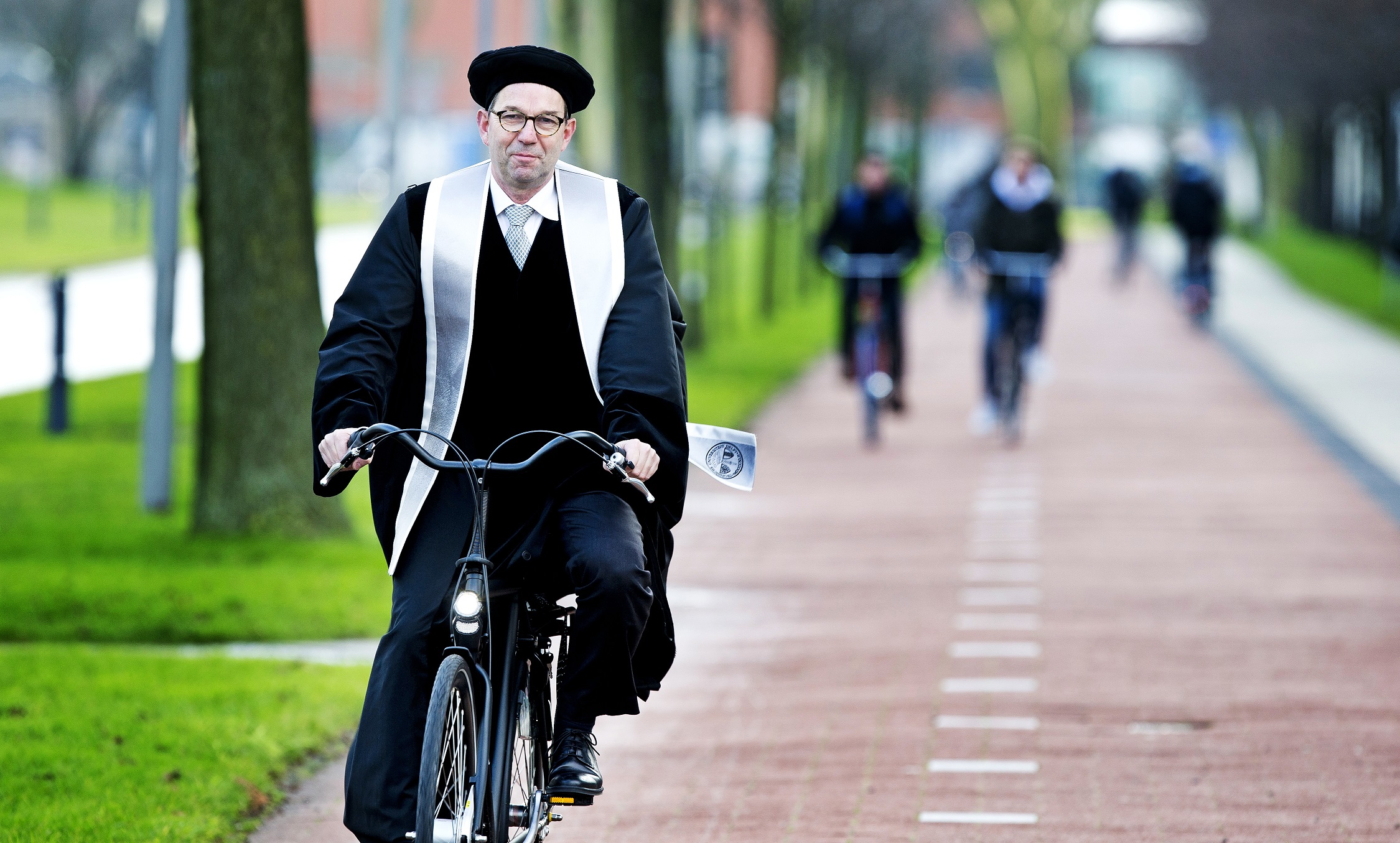How is the corona crisis affecting students and their studies? Executive Board member Rob Mudde wants to discuss this with them. What can he do for them?
Rob Mudde: “I expect to see a shift from immediate worries to concern about longer term well-being.” (Photo: Guus Schoonewille)
You have planned three Zoom meetings with students. The first one is on Friday 27 November. Why are you doing this?
“I’m trying to keep in contact with students. At the moment, I’m really only talking with student representatives. I’m not walking around anymore and can’t feel the atmosphere among students for myself. I can’t hold the breakfasts with the student associations anymore and I’m seeing fewer teachers. I don’t like not knowing how students are faring anyway, and especially now.”
You had a similar series of discussions at the beginning of the corona crisis. What did they tell you then?
“At the time students were mostly concerned about how things would progress. How Covid-19 would affect education, would there be study delays, could they do internships and so on. Internationals were also concerned about the situation in their home countries. Many students had problems concentrating. We held the discussions as a Q&A. There were a lot of questions, but I did not have that many answers. I tried to throw light on the situation, but I was moving in the dark.”
Were you able to do anything concrete with what you heard?
“Many students, and international students in particular, were worried about their finances. We set up a taskforce that they could share their stories with. This led to the creation of an emergency fund that was used by dozens of students. The number of students that applied was not as high as we expected. Many students are able to arrange their own affairs. The dropout rate was also no higher than usual. The study results in the third and fourth quarter were surprisingly good too. First years even earned more points than usual. That is a big compliment for students and staff.”
‘We can share our ups and downs’
What do you expect to hear in this round of discussions?
“I expect to see a shift from immediate worries to concerns about longer term well-being. We hear that students really want to come to campus and they know what they want to do there. This is mostly to do things together. They tell us, for example, that some teachers are trying to keep lectures going on campus in an adapted form. If they may come to TU Delft, students want working groups and interaction instead. We can pass this on to teachers.”
What more can you do for the students?
“The outcome of the discussions will not be that I leave with a list of things to do. We can all share our ups and downs and understand each other. We know that we cannot bring about what students want within the current restrictions. They ask, for example, why there are study places and halls available for some study programmes but not for theirs. They ask why things are different in different Faculties. If we would not allow that, we would have to base measures on the buildings that have the least room. This would be a shame for the places that are large enough such as Architecture and the Built Environment which has wide corridors and where the traffic flows fall within the RIVM (Netherlands National Institute for Public Health and the Environment) directives. The corridors are much narrower in the new AS building. No one would want us to base our regulations on this building.”
A student recently wrote to us that the lack of social contact is hindering the development of students. He wanted this to be taken into consideration. Is it on the radar?
“That was a good letter which raised recognisable issues. But we cannot solve everything for students. We will have to call on each other for support. We have several student psychologists, but not enough to solve the problems of all our 27,000 students. We cannot reach every individual student at this scale. So please use your creativity and take care of each other.”
‘The added value of education lies in the everyday things’
Do you have any tips on how to do this?
“It is becoming clear that the added value of education lies in everyday things. Maybe we need to use new means to do things or revive old tried and tested habits. You could create a group and write letters to each other about a book, the American presidential elections or anything else. Writing is reflective and this dark season invites reflection and writing. You also get to know people in a completely different way. I know this from experience.
Luckily, students are increasingly taking the initiative. The Delft De-stress Festival on 6 November is a good example. I was concerned about the day as it was the last day of exams and usually reason for celebrations. I was concerned about students complying with the restrictions later in the evening. After a meeting on this, within 10 days students had organised a Zoom festival with three DJs and de option for student houses to host their own stream. One thousand five hundred people joined the festival. Delft students were incredible.”
- Rob Mudde will hold three Zoom sessions for different groups.
– First year bachelor students: Friday 27 November
– First year master students: Friday 11 December
– All students: Friday 15 January
These small confidential sessions will be held from 17:00 – 17:45 - If you want to join, email student-communication@tudelft.nl stating your name, email address, course, year of study, and preference for Dutch or English. If you have a specific question, state it in your email. You will receive a confirmation with the Zoom link.
Do you have a question or comment about this article?
s.m.bonger@tudelft.nl


Comments are closed.